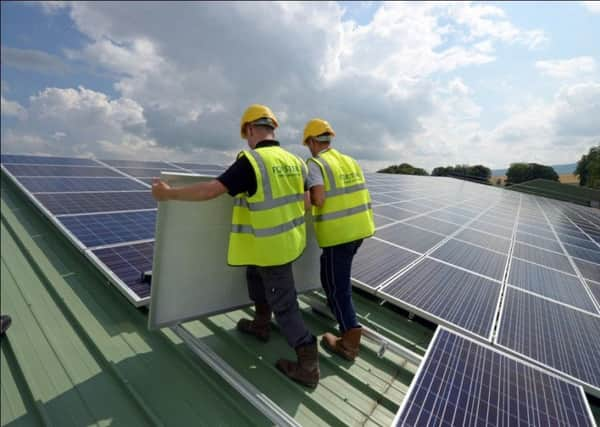Ronan Lambe: Shining a light on solar power advantages
This article contains affiliate links. We may earn a small commission on items purchased through this article, but that does not affect our editorial judgement.


While many in the market are optimistic that the point at which the economics of solar park development can be underpinned by proceeds of sale of the electricity generated alone is not too far away, we’re not quite there yet.
Advertisement
Hide AdAdvertisement
Hide AdGiven rapid and continuing price decreases in the key components of a solar park and wide-scale public support for solar, has the government missed a trick in cutting all support at such a crucial time?
The deployment of solar power in the UK has been rapid, rising from a very low base in the last decade to now almost 12GW of operational solar (four times the capacity of the new Hinckley Point C nuclear project). This still only represents approximately 3.4 per cent of our total electricity consumption (compared to Germany’s 41.2GW providing 15.8 per cent of electricity consumption).
The advantages of solar are well known, but bear repeating. Compared with other forms of renewable electricity, solar projects typically encounter fewer planning issues, being considered to have fewer environmental and visual impacts.
Solar parks can be constructed in comparatively short periods of time, minimising disruption to local communities. Dual-purpose usage means farmers leasing land for solar parks can often continue to graze certain livestock. No by-product or waste is generated by solar parks, they are noise-free and returning the land they are built on to its previous use at the end of the solar park’s operational life is comparatively straightforward.
Solar does have its downsides. Generation is skewed towards the summer months and solar panels do not generate electricity at night. These issues are increasingly being countered by the emergence of energy storage technologies and potential for co-location of solar with other renewable technologies such as onshore wind. Combined with storage, such co-location has the potential to address intermittency issues encountered with renewable technologies.
Solar parks generally fall into two categories: commercial developments which sell the electricity produced to an offtaker such as a utility via the National Grid, or an arrangement by a developer to build a solar park and sell the electricity produced directly to a large energy consumer (such as a factory or data centre).
Advertisement
Hide AdAdvertisement
Hide AdIn the latter case, the developer often receives an attractive fixed rate for such electricity, with excess electricity produced sold to a third party via the National Grid. A good example of the latter is Shotwick Solar Park in North Wales, the UK’s largest operational solar park. Pinsent Masons advised a consortium of WElink Energy, Compton Group and British Solar Renewables on the recent sale of Shotwick Solar Park, and we have acted on a number of similar deals.
Cost of energy is emerging as a key election issue. This is unsurprising, given the extent to which the issue features in discussions around board tables and dinner tables the length of the UK.
Solar has, over the last decade, demonstrated an ability to deliver a considerable proportion of our energy requirements in a clean and green way, supported by the public and at a cost which continues to fall. Issues such as intermittency are being reduced as a result of the emergence of storage and the potential for co-location with other technologies.
While new solar development is approaching a position where it can economically stand on its own two feet, arguably now is the crucial period for government to support the technology. With political focus so squarely on cost of energy, will the next government be brave enough to support this industry in its hour of need before an eagerly anticipated new dawn?
• Ronan Lambe is senior associate in the energy team at legal firm Pinsent Masons